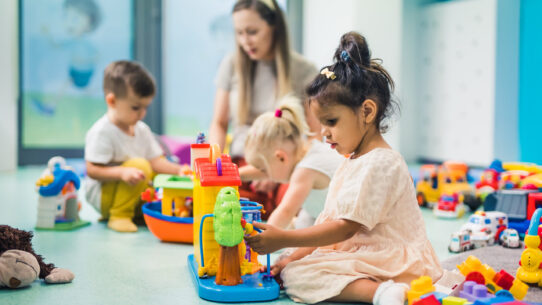We are thrilled that the U.S. House of Representatives is poised to pass the “Build Back Better” budget reconciliation package, which takes many critical steps to support Texas kids and families on issues from early learning to health care and beyond.
As we watch this historic vote and urge the Senate to take up the bill, I wanted to take a moment to unpack the transformative early learning provisions and ask for your help to get them across the finish line.

But first, let’s consider the vast early learning challenges facing Texas families today:
- In Texas, the average family spends nearly $16,000 a year on child care, or almost 25 percent of their income, meaning many families either can’t go to work, go broke in the process, or have to settle for unsafe, low-quality care.
- Meanwhile, child care educators often make around $10 per hour without quality benefits, leaving many child care educators in poverty, leading to constant turnover, and putting many programs on the verge of closing down.
- Although research shows that an additional year of pre-k in schools or child care partnerships has strong positive effects on Kindergarten readiness, only 9 percent of Texas three-year olds and 47 percent of four-year olds are enrolled in state-funded programs.
- Although this status quo has harmed families of all stripes, it has disproportionately impacted children of color and those in poverty during this critical age for early brain development, making it harder for them to succeed when they start elementary school.
Now here’s the good news. The budget reconciliation bill in Congress is designed to help states address these specific challenges, making an unprecedented $400 billion investment over six years to support kids, parents, and early learning providers. The bill:
- Guarantees families have voluntary access to free, high-quality pre-k for three- and four-year-olds, whether that is in their neighborhood school, a faith-based program, Head Start, or a child care program at a center or home.
- Significantly cuts families’ child care costs using a sliding scale. For example, a family of four making $66,000 or less would access child care for free; those making $88,000 would spend no more than 2 percent of their income on care; and a family making $200,000 would spend no more than 7 percent. That means a family of four with each parent earning $55,000 per year would see their monthly child care payments capped at $367, potentially saving them more than $1,000 each month, given the current cost of child care.
- Boosts the quality of child care and pre-k by ensuring programs meet some of the essential components for effectiveness, such as improved group size and student/teacher ratios.
- Significantly increases funding going to schools and child care programs to meet these new standards. Specifically, the bill funds programs based on the costs of maintaining quality, rather than relying on outdated market rate surveys.
- Strengthens the early learning workforce by requiring programs receiving funds to offer a living wage for educators and creating a pathway to compensation parity between school and child care educators, including support for educators to increase their credentials.
Fortunately, these early learning provisions in the budget reconciliation bill are consistent with the direction Texas leaders are heading:
- In recent years, Texas leaders have recognized the power of pre-k, investing in full-day pre-k for eligible four-year-olds in 2019 through HB 3 and taking other steps to strengthen pre-k.
- During the 2021 legislative session, lawmakers like Rep. Angie Chen Button and the members of the new Early Childhood Caucus showed a new, bipartisan interest in child care, passing a package of bills that take vital first steps to improve the quality of child care.
- Just last week, the Texas Workforce Commission invested $665 million in federal COVID relief funds in child care — a significant, temporary step that the budget reconciliation bill in Congress can help continue.
To implement many of the budget reconciliation bill’s early learning provisions in Texas, we will need continued leadership from state leaders:
- While other parts of the bill can be implemented with little involvement from the states, the child care and pre-k provisions are designed to be a partnership between the federal government and states.
- Just as we fully expect Texas to use the highway funding in the infrastructure bill that Congress just passed, we also expect Texas to maximize the early learning funding.
- Early learning advocates and community leaders will be working hard in the coming months to ensure that our state leaders develop a strong Texas plan to take full advantage of this opportunity.
We look forward to working with our partners throughout the state to ensure Congress quickly sends this legislation to the President and Texas takes advantage of this exciting opportunity.



